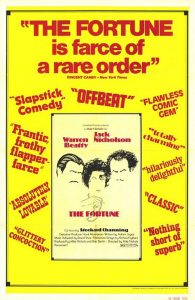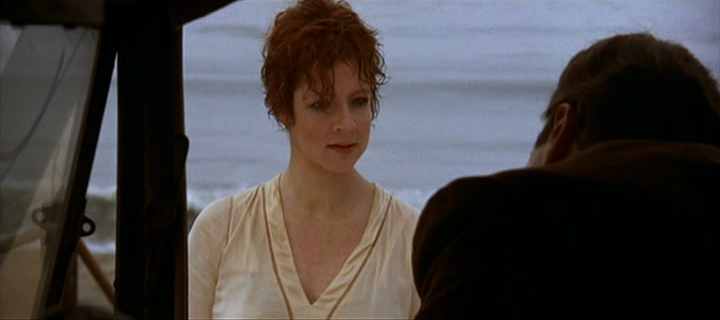Fortune, The (1975)
“She’s the mouse-bed heiress.”
|
Synopsis: |
|
Genres, Themes, Actors, and Directors:
Review:
(The Mann Act was more commonly known as the “White-Slave Traffic Act”, and was meant to “combat forced prostitution and ‘debauchery'” of white women, though that historical context is never made relevant.) We quickly learn — in an elaborate visual “joke” — that Channing will marry wild-haired Nicholson instead of Beatty (who she’s obviously in love/lust with), but it’s never explained why flying to Los Angeles will help Beatty’s status as an already-married man, or how much he may actually like Channing apart from her wealth. Eventually, he and Nicholson collude to kill Channing, planning to split the proceeds 50/50 — but everything about this plan smells justifiably foul, and inevitably goes awry. There’s some fun to be had in watching Channing nimbly escaping from the bumbling duo’s feeble clutches, but the point of it all simply isn’t clear. Note: The quote selected above alludes to Channing’s status as the heiress to a sanitary pad company; Nicholson shares a lame anecdote early on about being told these were “mouse beds” as a child, hence the continual wordplay. Redeeming Qualities and Moments: Must See? Links: |



2 thoughts on “Fortune, The (1975)”
First viewing – not must-see; in fact, you can skip this one altogether.
How this annoying act of hubris came into existence is not all that difficult to understand, considering that at least half of director Nichols’ films are made from inferior scripts…which he may have felt he would be able to improve with directorial wizardry.
When a script is good, and when a director is working at his best, the result will usually be a satisfying work in which the actors shine and the audience isn’t thinking about how it all came together.
But when something is this bad and yet it has been orchestrated by a first-rate director and a top-notch production design crew (and a period piece at that!), it takes the best actors available to…maybe…keep it afloat.
Channing tends (usually) to be consistently good and enjoyable to watch – but, even though she is giving this role her best shot, she can only do so much with her superficially drawn character.
Nicholson works well in comedy when he has a funny script. Since he doesn’t have one here, he is given a weird hairstyle and makes nerdy with his voice and facial expressions, etc., in sad attempts at being funny.
Beatty is the worst of the three – showing, through his usually forced delivery, that he does not have much of a knack for playing comic material.
What we mostly see here is Nichols trying desperately to make this movie fly. Occasionally he does serve up a genuinely amusing sight gag (which again reminds us there is nothing funny in the script). But we really shouldn’t be witnessing a director (or cast) trying this hard to compensate.
The script’s premise is actually a good one – but that’s all this movie really has. How did anyone think the screenplay was ready for action in front of a camera? While watching (and because, as noted, the story’s core is not all that clear), we get the sense that the film may have been considerably cut down to its 85-minute running time. Perhaps the idea there was to maximize the comic effect – and hide flaws – through brevity. Many comedies do benefit from being ‘short and sweet’. But ‘The Fortune’ is nothing but tiresome almost from the get-go.
It runs amlittle longer than you say David at 88 minutes; I’ve just received the UK Blu-ray checkdisc to review for http://www.dvdcompare.net (my technical review will be up within the next few days for those interested).
Anyway, the film was backed by Beatty (he was the driving force) solely so he could get Shampoo (1975) made which he’d been touting since 1967. The original script by Carole Eastman was much more intellectual and reportedly far superior. However, Mick Nichols wanted to make it more a throwback to 1930s screwball comedies and thusly cut it about. Eastman was fired and she used the pseudonym Adrien Joyce on the 1974 film’s prints.
I’m partially through viewing the film as I type this and my feelings thus far are that it’s a very wrong-headed subject for the more serious elements in the script. Nicholson and Channing are excellent and funny but at times her character is treated very badly in a too serious way for the shenanigans … it’s leaving a bad taste. I shall post my thoughts on the whole thing soon.